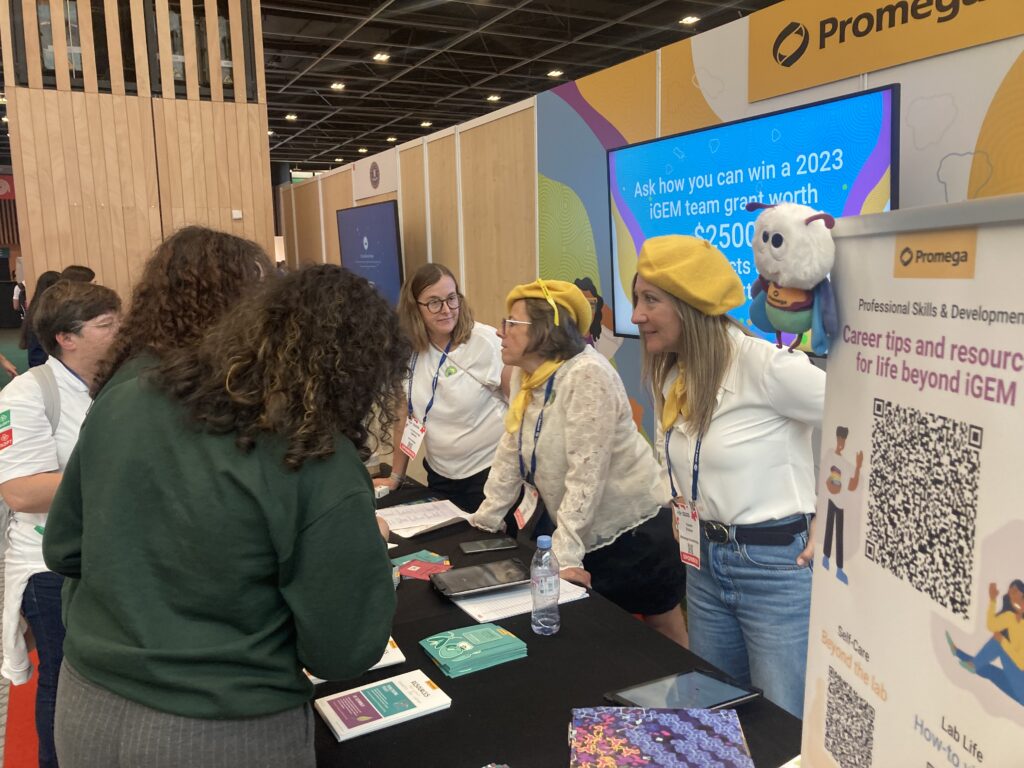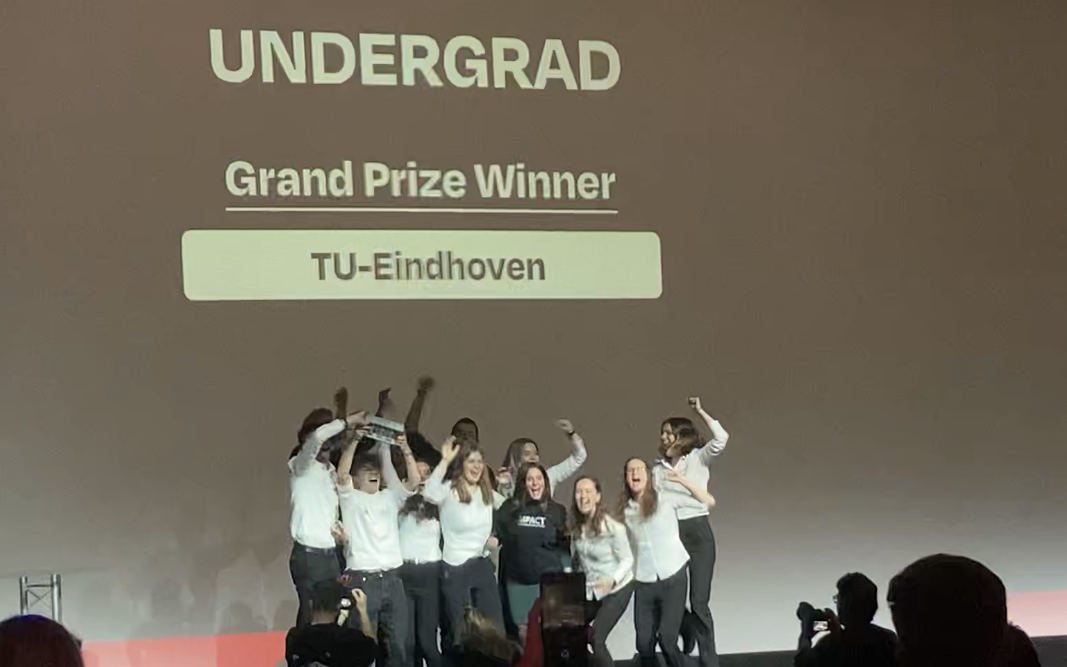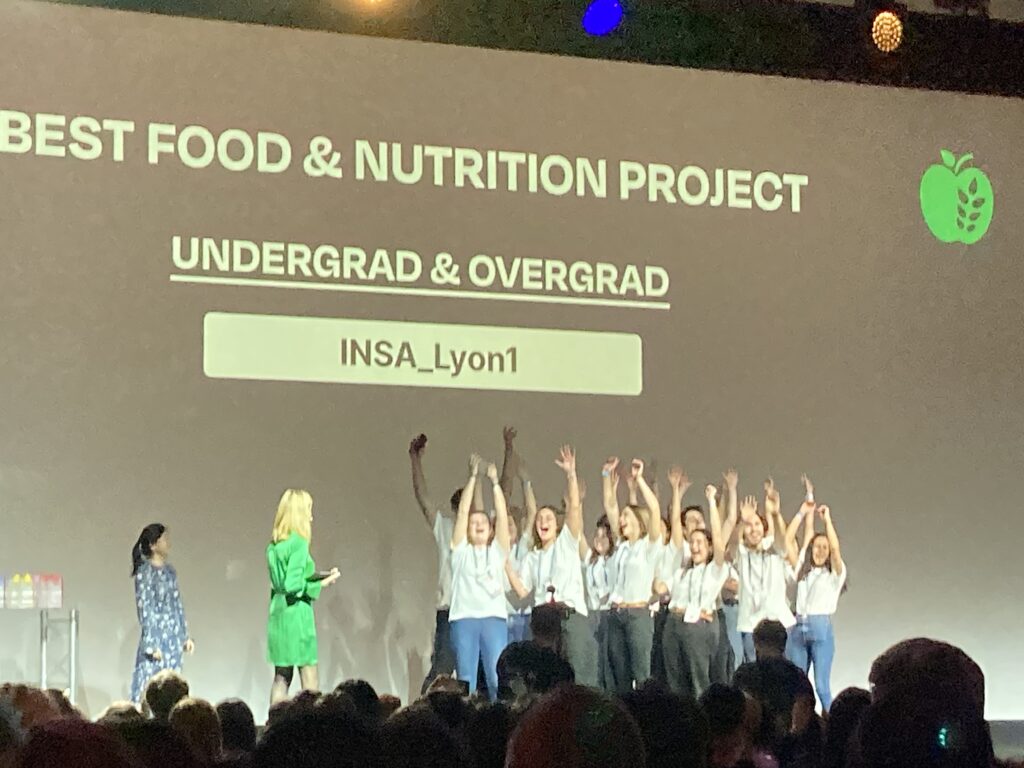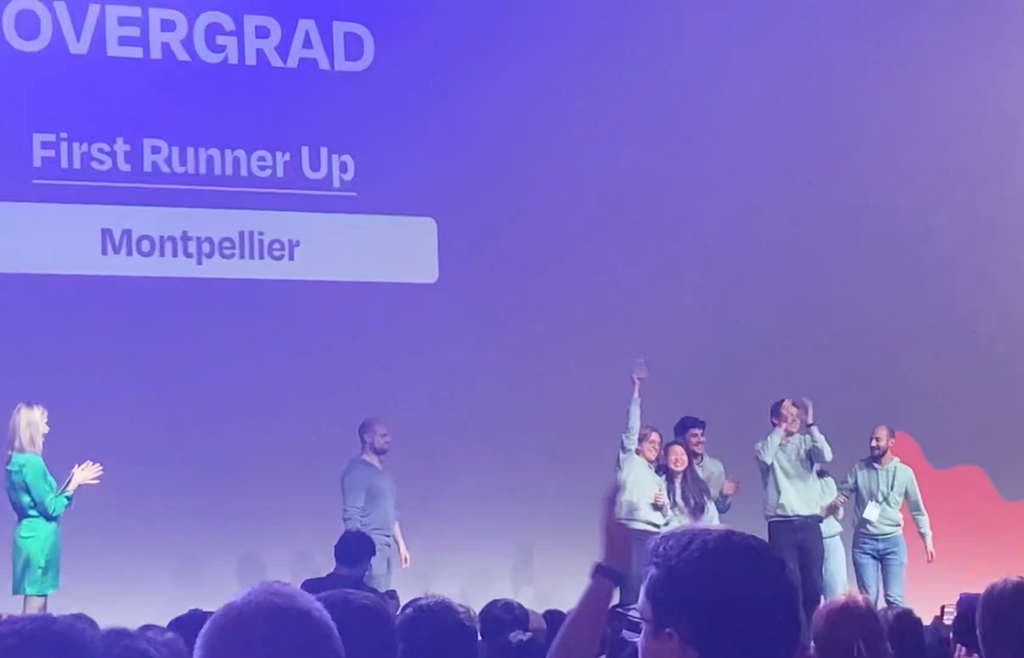On October 26, hundreds of young scientists made their way through Paris to convene at the Paris Expo Porte de Versailles for the world’s largest synthetic biology competition. The iGEM Grand Jamboree showcases student projects from around the world that tackle real-world challenges such as nutrition, diagnostics and climate change.
Each year, ten Promega iGEM Grant winners receive $2,500 in free Promega products to support their research. Many Promega branch offices also provide support to teams within their region. In total, 36 iGEM teams were supported by Promega during the 2022 competition.

Six representatives from Promega Madison, France and Germany attended the Jamboree. We met so many incredible scientists and had countless conversations about the exciting future of synthetic biology. At the Closing Ceremonies, we were thrilled to see many of our sponsored teams take home gold medals, trophies, and even the coveted BioBrick Trophy.
TU Eindhoven: Undergraduate Grand Prize Winner 2022 iGEM

In the undergraduate division, Grand Prize Winner TU Eindhoven competed in the Therapeutics category. Their project focused on ANCA-associated vasculitis, a rare but life-threatening autoimmune disease. According to the team’s wiki, current treatments for the disorder can be expensive and ineffective, and do not prevent relapses.
The team designed a cell-based therapy called !MPACT to detect autoantibodies and active the release of the anti-inflammatory cytokine IL-10. The system is administered similarly to CAR T-cell therapy: the patient’s immune cells would be harvested and engineered with the synthetic receptor, then released back into the patient’s body. The team designed the system with modularity in mind – they claim that !MPACT can be customized with different receptors to treat multiple autoimmune disorders.
In addition to the grand prize, TU Eindhoven received awards for Best Therapeutics Project, Best Presentation, Best Integrated Human Practices, Best Model, and Best Supporting Entrepreneurship. TU Eindhoven received support from Promega Benelux.
INSA Lyon: Undergraduate First Runner-Up

Imagine if there were no potatoes. For Madeleine, one of the presenters for the French team INSA_Lyon1, the thought of no French fries was almost too much to handle. The team from the National Institute of Applied Sciences of Lyon began their presentation with a stark warning that climate change is driving a rise in plant pathogens that will ultimately threaten food security. To address this problem, the team created a novel system called FIAT LUX for studying the propagation of pathogenic bacteria within a host.
FIAT LUX is based on the ilux operon, which was optimized and characterized in E. coli. The team expressed their plasmid in Dickeya solani bacteria, which is a known pathogen of potatoes. The result was a luminescent bacterium that could be easily visualized in plant tissue. The team took their project even further by creating a prototype luminometer using a wooden box and inexpensive electrical components. The data gathered by this device can be analyzed by software created by the INSA Lyon team.
INSA Lyon took home quite the pile of awards for their project. In addition to being the first runner-up in the undergraduate division, the team took home trophies for Best Food & Nutrition Project, Best Wiki, Best Presentation, Best Education, Best Hardware and Best New Composite Part. INSA Lyon was supported by Promega France during the 2022 season.
Montpellier: Overgraduate First Runner-Up

The Promega team agrees – one of our favorite things we ate in Paris during the Jamboree was a tray of oysters grown in Brittany. France is responsible for over 85% of the oysters produced in Europe, but pathogens such as Vibrio aestuarianus and the Ostreid Herpes Viruscan result in up to 80% of production loss. The iGEM team from Montpellier developed a Cas13-based field test to detect oyster pathogens on the farm.
The test uses paper strips to detect specific pathogens in water from the farms. The reaction requires two key components: an RNA probe bound to biotin and 6-fluorescein amidite (FAM), and a gold nanoparticle bound to a rabbit antibody. In a control test, the antibody binds FAM and migrates down the strip until it reaches a biotin ligand. At this point, biotin will bind its ligand and stop the progression of the nanoparticle. However, when the target RNA is present, cas13 will cleave the probe. With no attached biotin, the antibody will migrate farther until it reaches an anti-rabbit antibody in the Test position of the strip. This will stop its progression and result in a visible band on the test strip.
Montpellier worked extensively with local oyster farmers to design a system informed by end-user needs. Current testing methods require lab equipment to which few in the shellfish industry have convenient access. By pairing the paper test with a smartphone app for data analysis, the team hopes to empower farmers with a simple tool for early pathogen detection.
Congratulations to all 2022 iGEM teams!

We are proud to share that Promega-sponsored 2022 iGEM teams received 25 gold medals, 9 silver medals and 1 bronze medal. Many teams also claimed trophies for awards including Best Climate Crisis Project, Best Hardware, Best Supporting Entrepreneurship, and Best Software. Nine Promega-sponsored teams appeared in the top ten lists for the overgraduate and undergraduate divisions.
The 2022 iGEM Grand Jamboree was energizing and inspiring, and a ton of fun. We met Spiderman, reconnected with former competitors who have progressed in their careers, and learned about impactful science using the most cutting-edge techniques. More than anything, we can’t wait to see the impact these incredible young scientists will make on our world as they continue in their careers.
Want to learn more about iGEM? This collection of blogs about iGEM teams and the competition is for you.
Latest posts by Promega (see all)
- Accurate and On-Time: A Look Inside Promega Logistics - June 24, 2025
- Augmenting Human Capabilities with AI Tools - June 17, 2025
- Lead with Empathy: Supporting Caregivers in the Workplace - June 3, 2025
